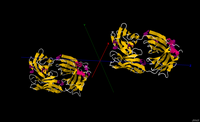
Photo from wikipedia
Kirsten rat sarcoma viral oncogene homolog KRAS proto‐oncogene is the most common altered gene in colorectal cancer (CRC). Determining its mutational status, which is associated with worse prognosis and resistance… Click to show full abstract
Kirsten rat sarcoma viral oncogene homolog KRAS proto‐oncogene is the most common altered gene in colorectal cancer (CRC). Determining its mutational status, which is associated with worse prognosis and resistance to anti‐epidermal growth factor receptor (EGFR) inhibitors, is essential for managing patients with CRC and colon liver metastases (CLM). Emerging studies highlighted the relationship of KRAS‐mutated cancers and tumor microenvironment components, mainly with T cells. The aim of this study was to analyze the relationship of CLM immune cell infiltrate with KRAS mutational status. We performed a retrospective study on paraffin‐embedded CLM tissue sections from patients surgically resected at the Department of Hepatobiliary and General Surgery of Humanitas Clinical and Cancer Center. We studied the distribution of lymphocytes (CD3+ cells), macrophages (CD163+), and neutrophils (CD66b+) in CLM tumoral and peritumoral area. Percentage of positive cells was correlated with tumor macroscopic characteristic, clinical aspects, and KRAS mutation. We observed a significant increase in CD66b+ cells in the peritumoral area in patients KRAS‐mutated compared to KRAS wild‐type patients. Percentages of lymphocytes and macrophages did not show significant differences. Further, neutrophils were found to be significantly increased also in the bloodstream of KRAS‐mutated patients, indicating increased mobilization of neutrophils and recruitment in the CLM site. In conclusion, this study reveals a new intriguing aspect of the peritumoral microenvironment, which could pave the way for new prognostic and predictive markers for patient stratification.
Journal Title: Journal of Leukocyte Biology
Year Published: 2020
Link to full text (if available)
Share on Social Media: Sign Up to like & get
recommendations!